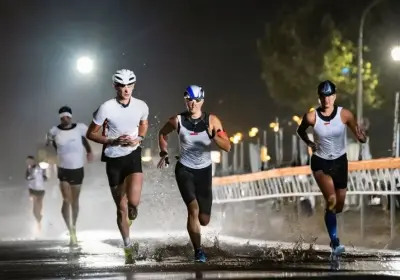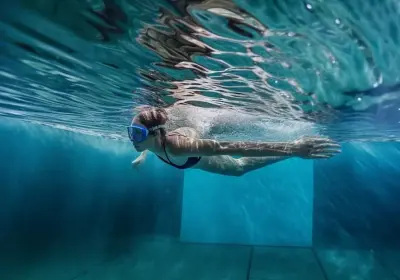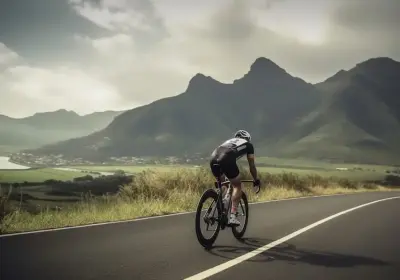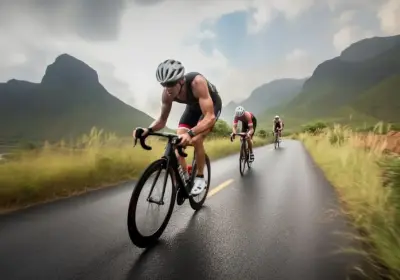Plan your triathlon season

- 1. Understanding the Triathlon Season: Why Planning is Essential
- - Gaining a Comprehensive View of the Season
- - The Importance of Setting Objectives Early On
- - Balancing Training and Rest Periods
- 2. Essential Components of a Successful Triathlon Season Plan
- - Mapping Out Key Races and Events
- - Customizing Your Training Routine
- - Integrating Strength and Conditioning Sessions
- 3. Achieving an Optimum Training Balance: A Guide for Triathletes
- 4. Nutrition and Hydration: Pillars of a Triathlon Season Plan
- - Understanding the Importance of Nutrition
- - Smart Hydration Tactics
- - Race Day Nutrition Strategies
- 5. Common Mistakes in Triathlon Season Planning and How to Avoid Them
1. Understanding the Triathlon Season: Why Planning is Essential
The triathlon season involves a strategic blend of planning and execution, acting as a high-octane challenge that tests both physical prowess and mental grit. Understanding the structure of the season is crucial as it aids you in setting realistic objectives early, thereby enhancing your competitive edge. This also paves the way to balance meticulously your training and resting periods, a critical factor often underestimated by athletes. Embracing a holistic view of the triathlon season goes beyond the finish line - it's about recognizing each phase's significance, making every stride, every swim stroke, and every pedal counts towards your journey to peak performance.
- Gaining a Comprehensive View of the Season
As a triathlete, having a comprehensive view of the season is paramount. Being aware of the big picture enables you to prepare adequately, which can lead to better results and a more rewarding triathlon journey. Think of the season as your canvas, on which to paint a carefully designed training plan. You'll need to map out the key races, plan your training routines, rest periods, and nutrition, while also allowing room for flexibility. To gain a broader perspective, start by setting your objectives. Ask yourself, 'What do I want to achieve this season?' Your answers could range from improving your overall performance, mastering a specific skill, or preparing for a significant race. Once you've established your objectives, align them with the season's timeline, setting milestones that guide you through the journey. Also, bear in mind the role of balance in this journey. It is crucial to balance your training and rest periods to prevent overexertion and promote optimum performance. Additionally, maintaining an optimum training balance involves dedicating equal time and energy to training for all three triathlon sports – swimming, cycling, and running. This requires careful planning and a strategic approach to maximize your strengths and work on your areas of weakness. Remember, gaining a comprehensive view of the season isn't just about training. It involves a holistic approach, incorporating aspects such as nutrition, hydration, and mental preparation. With a broad, all-encompassing perspective, you're setting a solid foundation for a successful, rewarding triathlon season.
- The Importance of Setting Objectives Early On
Reaching new heights in club or competitive triathlon requires both vision and direction. A crucial step often overlooked in season planning is setting objectives early on. Having a clear end goal in mind provides the motivation you need to power through challenging training sessions, maintain discipline, and stay on track even when the going gets tough. Consider this, without comprehensive objectives, how can one gauge progress? Or even validate the success of their training plan? How can one identify weaknesses and work on refining them? Clearly-defined targets give an athlete a sense of direction and purpose, enhancing the training experience altogether. Objectives aren't merely about setting a finishing time; rather they may encompass varying aspects of your performance. For instance, an athlete can aim to maintain a constant pace or focus on improving swimming techniques. The key lies in setting SMART goals - Specific, Measurable, Achievable, Relevant, and Time-based. This encourages realistic expectations, and when paired with consistent effort, helps shatter plateaus, forging an upward trajectory in athletic performance. So, as you gear up to outline your triathlon season, remember to prioritize your objectives. Dive deep into your athletic desires and transform them into action points, setting the foundation for a successful and rewarding triathlon season.
- Balancing Training and Rest Periods
Balancing training and rest periods is crucial for a successful triathlon season. Exhausting yourself in training without giving your body time to recuperate can have counterproductive effects. The idea that overtraining will lead to better outcomes is, in fact, a myth. Resting isn't a sign of weakness or laziness; it's an essential component of an effective training program. It’s during these periods of rest that your body rejuvenates, repairs, and gets stronger. When drawing up your triathlon season plan, it is important to ensure that your intense training days are followed by sufficient recovery days. A common approach adopted by many accomplished triathletes is the 'hard-easy' method. This involves alternating between rigorous training days and easy workout or rest days. Incorporating rest days into your routine is impactful to both your physical and mental well-being. It's also recommended to have a full-out rest week every fourth week, where training load is significantly reduced. This can tremendously benefit your performance in the long run and prevent burnouts. Remember, balancing training and rest periods isn't just about avoiding injuries, it’s about strategic conditioning that can optimize your performance. Don't overlook the power of rest and recovery during your triathlon season planning. It may well be the secret ingredient that propels you to the finish line faster!
2. Essential Components of a Successful Triathlon Season Plan
When planning for a triumphant Triathlon season, several key elements warrant serious consideration. Firstly, identifying and organizing your key races and events acts as the backbone of your annual plan, allowing you to strategically work backward in structuring your training routines. These routines should be tailored to your specific needs, endurance levels, and desired outcomes. Simultaneously, it's critical to integrate strength and conditioning sessions into your plan. These not only boost your overall athletic strength and endurance but also act as safeguards against injury, ensuring you remain in peak physical condition throughout the taxing season. Remember, a well-planned structure is a lifeline in the unpredictable world of Triathlon. Your journey to victory begins with a detailed, well-considered plan. Now, are you ready to map out your path to success?
- Mapping Out Key Races and Events
Mapping out key races and events forms an integral part of structuring a successful triathlon season plan. As a triathlete, setting your sights on specific races is imperative. This is not only a motivating factor but also lays the foundation for your customized training routine. These races become the milestones that pace your preparation and gauge your progress. But how do you pick the races? Well, not every race can be your key event. It's essential to focus on quality over quantity and pick the events that align with your long-term goals and strengths. It's much more rewarding to perform well in a few targeted races than to exhaust yourself by trying to participate in every single race. Moreover, while mapping out the key events, do remember to leave out ample time for recovery post-race. Ignoring recovery can lead to burnout, which is a common mistake overlooked by many triathletes. Therefore, a well-planned triathlon season is not just about picking races; it's about selecting them intelligently, giving your best shot, and scheduling some rest afterwards for the body to replenish and prepare for the upcoming challenges. So, align those race dates with your calendar and kick start your journey to an exhilarating triathlon season.
- Customizing Your Training Routine
Every triathlete knows the importance of a detailed and adaptive training routine. However, it's not just about pushing yourself to the limit but doing so intelligently. Firstly, you ought to break down your training into bite-sized chunks. This could mean focusing on individual athletic disciplines each day or mixing it up with different combinations throughout your training week. But remember, customization is king. Understand your own strengths and weaknesses. Are you a natural swimmer but struggle on the bike? Then tailor your training to give those weaker areas extra attention. It's also key to factor your lifestyle into your training, as maintaining a healthy work-life balance is critical for optimum performance. Early bird? Pencil in those lung-busting runs for dawn. Night owl? Hit the pool when others sleep. Lastly, don’t overlook the power of benchmarking. Regular testing is essential to track progress and adjust your routine accordingly. After all, what’s measured gets improved. So whether it's swimming, cycling, running, or all three, keep your finger on the pulse of your performance and continuously strive to reach new personal bests. Remember, the perfect plan doesn’t exist. It's a constant process of adaptation and improvement. That's the real secret behind customizing your training routine. Happy training!
- Integrating Strength and Conditioning Sessions
Integrating strength and conditioning sessions into your triathlon season plan is not just optional; it's a must. These sessions are crucial in developing the strength and endurance you'll need to power through your races, from the first buoy to the last mile. They're where we build the resilience required to ward off injury and withstand the physical demands of continual training. Don't be fooled into thinking that these sessions are just about lifting weights. Oh no, it's much more than that. They encompass a range of activities designed to improve your power, balance, speed, and mobility, as well as muscular strength. Are you determined about improving your stride efficiency during the run or packing more power into your pedal stroke? Your strength and conditioning sessions can be tailored to target these specific goal. But remember, it's not a one-size-fits-all approach. Your sessions should be uniquely designed to suit your abilities, your weaknesses, and your race goals. It's about cleverly integrating them into your overall plan to ensure they complement, rather than hinder, your swimming, running, and cycling sessions. By doing so, you should see a significant improvement in your performance and an incredible boost in your overall race experience. Trust me, your future self will thank you for it.
3. Achieving an Optimum Training Balance: A Guide for Triathletes
Achieving an optimum training balance is a critical part of preparing for triathlon season. As a triathlete, it's important to remember that successful training isn't merely about endurance, speed, or strength but about carefully combining all those aspects. Ensuring equal focus on running, swimming, and cycling individually can prevent over-training in one area and under-training in another. Cross-training plays an essential part here, diversifying your workout regimen, reducing burnout chances, aiding muscle recovery and enhancing overall performance. Yes, rest! It's not the enemy but your valuable ally in muscle repair and energy restoration. Embrace rest days as much as your training sessions—they're key to a well-rounded, effective triathlon training program.
- Training for All Three Sports
Triathlon training is the perfect symphony where each musical instrument represents one sport, i.e., swimming, biking, and running. It's crucial to invest equal time for training in all three sports, holding in mind they each require a unique set of skills and abilities. The key to success in a triathlon is not just mastering each sport individually but also understanding how to transition smoothly among them. To optimize your training, remember the diverse physical demands each discipline will place on your body. Swimming demands strong upper body strength, biking relies on the power of leg muscles while running tests your overall endurance. It's crucial to incorporate specific training regimes for each sport to build your stamina, power, and efficiency. Remember, a great triathlete is not simply an extraordinary swimmer, biker or runner; they are a unique blend of all three. While cross-training can complement the training regime, nothing can replace the specific training each sport demands. Pursuing a balanced, comprehensive plan helps in enhancing your overall athletic prowess without favoring one sport over others. Always remember, in a triathlon it's about the harmony of all three sports combined, not the outstanding melody of just one. So, set your challenges, push your limits, and conquer the triathlon with the power of all three sports.
- Importance of Cross Training
Cross-training is an essential chapter in the book of any proficient Triathlete. What makes it so crucial? Well, Cross-training promotes the development of varied muscle groups, improving overall fitness and reducing the risk of injury. As triathletes, we often find ourselves immersed in the 3 core disciplines - swimming, cycling, and running. While these are vital, being open to including other forms of exercises into our regimen can bring in a healthy change, that not only develops us physically but mentally. Ever wondered why professional athletes pick up yoga, Pilates, or rock climbing? These activities condition the body differently, allowing versatility in developing strength and endurance, in turn enhancing performance in triathlons. These seemingly unrelated exercises can also aid in quicker recovery and provide great relief during those much-needed rest days. The cross-training approach is not just an alternative routine; it's an edge you give yourself over others. So, the next time you plan your Triathlon season, remember the often-underestimated importance of cross-training. Is it time to diversify your training and embrace a more balanced, comprehensive approach? After all, variety is the spice of life and could be that secret ingredient in your Triathlon success recipe.
- The Role of Rest and Recovery
The Role of Rest and Recovery holds a pivotal position in any triathlon season plan. Refreshingly, it's not all about the miles you splash, cycle, or pound on the pavement. Brick sessions and interval sprints are crucial, but the magic brew that lets you stir up improved performance is a cocktail of both training and rest. It's during these downtime stages your body repairs, rebuilds, and strengthens itself. Not only is quality sleep the cornerstone of recovery, it's at this time that adaptations to training occur, and energy stores are replenished. Yet, it's neglected often. Sitting back and putting your feet up may seem counter-intuitive when you're conditioned to think that pushing harder yields progress. But failing to respect your body's plea for a pause can lead to overtraining syndrome, injury, or burnout. Remember, training breaks you down, rest builds you up. It's a balanced card of exertion and ease that elevates your game. So, fellow triathletes, don't let rest be an afterthought in your strategy; it's not just about the triad of swim, bike, run, it's also about the unmentioned forth discipline – recovering. Is recovery given its due place in your triathlon agenda?
4. Nutrition and Hydration: Pillars of a Triathlon Season Plan
The importance of proper nutrition and hydration cannot be overstated in the world of triathlons. It's as crucial as your training regimen to ensure peak performance. Fueling your body adequately, with a balanced blend of carbohydrates, protein, and fats, is essential not just on race days but throughout the training period. Hydration, meanwhile, isn't merely about guzzling gallons of water. It's about maintaining an optimal electrolyte balance to prevent cramping and facilitate better endurance. Smart hydration tactics and sound nutrition strategies, tailored to your unique metabolic needs, can be game-changers on race day. Because a nourished, well-hydrated body can be the difference between a good race and a great one.
- Understanding the Importance of Nutrition
In the riveting world of triathlon, nutrition is undeniably a cornerstone in achieving the ultimate racing performance. But why exactly is it so important? To put it simply, your body needs fuel—and not just any fuel, but the right kind of fuel. Training routines for triathlon are intensive and exhaustive, and they require the kind of energy that can only come from a balanced, nutrient-rich food. Just as you wouldn't attempt to fill up a diesel truck with petrol and expect it to run smoothly, you can't ignore the specific needs of your body and anticipate optimal performance. Good nutrition isn't just about the day of the race—it's about every meal and snack leading up to that day. Your body is a well-oiled machine—if you keep it fine-tuned and filled with quality energy sources, you're one step closer to that photo finish. Remember, though, that every athlete is unique, with specific nutritional needs aligned with their training regimen and overall health. You might have to engage in some research or consult with a professional to discover the food plan that will work best for you. After all, it's a lot to swallow, right? But good nutrition is worth biting off. Understanding this essential component can help you cross not only the finish line but also the vast chasm between ordinary and extraordinary performance. Stay tuned for more insights into this critical aspect of triathlon training.
- Smart Hydration Tactics
In the realm of triathlon, the value of smart hydration tactics cannot be overstated. It's not just about downing any available liquid, but more about a quality, strategic intake. You should be in tune with your body's specific hydration needs and tailor your fluid intake accordingly. One proven method is to monitor your weight before and after your training sessions. A decrease signals that you haven't replenished enough hydration, while an increase might suggest an excess. You've got to strike the right balance. Also, don't ignore the role of electrolytes here. When you sweat, you lose important minerals like sodium and potassium, which need replenishment for optimal performance. Making use of sports drinks, or water paired with a balanced snack can help here. Additionally, it’s crucial to understand that hydration isn't just a race day concern. It's an essential part of your daily routine. Staying adequately hydrated every day ensures your body is prepared optimally for the rigor and demands of intensive training and racing. Altogether, effective hydration takes more thought than simply drinking water. Remember, smart hydration is a tactic that can ultimately make the difference between finishing strong or fading on the race course.
- Race Day Nutrition Strategies
On the subject of Race Day Nutrition Strategies, no stone should be left unturned. As a triathlete, you should acknowledge the immense significance of fueling your body aptly for the challenge ahead. Just like a race car being prepped for the track, you need a focused and calculated approach towards nutrition. On race day, consuming high-quality carbohydrates will be elemental, this is not the day to cut carbs! Complex carbs from foods such as pasta, oats, and sweet potatoes should be your go-to. Ensuring that your glycogen stores are stocked up and ready to fuel your race is crucial. Additionally, protein is your repair and recovery best friend. Don't ignore it. Your race meal is significant, yes. But don't neglect a handy snack 30 minutes before the gun goes off. One strategy to implement is the consumption of a go-to energy bar or a banana. It helps keep those energy levels stable. Lastly, practicing smart hydration will be the linchpin holding your race day nutrition plan together. Opt for sips instead of gulps to maintain a hydrated state throughout the race. Soaking up this knowledge is only the first step. Applying it is where your unstoppable race day begins. Embrace it wholeheartedly, and you're onto a game-changer in your triathlon season plan.
5. Common Mistakes in Triathlon Season Planning and How to Avoid Them
In the world of triathlon, creating an effective season plan is a complex ballet, delicately balancing training, rest, and nutrition. Unfortunately, many triathletes trip over common pitfalls that can undermine their performance. One significant mistake is overlooking long-term goals. Rather than focusing solely on immediate challenges, keep your eyes on the horizon. Long-term targets provide direction for your training and keep motivation high. Another common misstep is neglecting rest days. Remember, recovery isn’t laziness, it’s an essential part of building strength and endurance. Finally, let's not forget the crucial role of nutrition and hydration. Neglecting your diet will only land you at the back of the pack. Now, grabbing every opportunity to optimize our season planning is the key. After all, success in a triathlon doesn't descend out of the blue - it's the culmination of thoughtful planning, commitment, and hard work.
- Overlooking Long-Term Goals
In the multisport world of triathlons, it's disconcertingly easy to get wrapped up in the thrill of the immediate moment. This often leads athletes to overlook their long-term goals. It's comparable to scaling a mountain but losing sight of the peak. These long-term objectives are what should be guiding and animating your entire season. Without them, you're simply treading water, or worse, unknowingly veering off track. Remember, every single session and decision should be consciously contributing to your broader, in-the-future targets. Basically, they provide the framework for your training journey. Neglecting these vital signposts is akin to setting sail without a compass. Whether your aspiration is to improve your race timings, augment your stamina, or master a complex skill - the essence is to keep your eyes on the prize. However, let's be clear, embracing long-term goals doesn't mean disregarding short-term aims. These are, after all, the steps that pave your way. The secret is in maintaining a strong balance, ensuring that your immediate efforts nourish rather than undermine the eventual, larger success. So, don't get too caught up in today's gusts and waves that you lose sight of the horizon. After all, isn't that why we sail?
- Ignoring Rest Days
Rest days are nothing short of a holy grail in the demanding and tight-knit world of triathlon season planning. Unsurprisingly, it's quite easy to fall prey to the mishap of ignoring rest days. The thrill of training and the inherent want to outperform your personal best can often lead you to overlook the critical importance of rest days in your meticulously charted season plan. Remember, rest is not the enemy of progress, but a quintessential partner. Taking time for rest and recovery allows your body to repair tissues and muscles that get broken down during intense training sessions. More importantly, these strategic mini breaks help alleviate mental fatigue and reduce the risk of injury - two factors that every successful triathlete addresses astutely. Never underestimate the power of a well-timed day off! It’s a simple, yet crucial opportunity to recharge your batteries and prepare both your mind and body for future training onslaughts. Think about it - is continuously pushing at full throttle without giving your body the time to recuperate really conducive to long-term success? The answer, as any experienced triathlete will tell you, is a resounding no. So, do yourself a favor, and start valuing your rest days as much as your training bouts. After all, a proper balance is key in triathlon, as it is in life. It's time to start listening to your body and give it the rest it needs and deserves.
- Neglecting the Nutrition and Hydration Plan
One costly mistake in a triathlon season planning that many triathletes may unknowingly fall into is neglecting the significance of their nutrition and hydration plan. Consuming the right nutrients and hydrating properly is not just a tagline for a healthy lifestyle, it's a game-changer for those serious about their triathlon performance. Why is it such a big deal, you ask? Picture this: your body is much like an engine, and food and water are its fuel. Try running an engine without adequate fuel, and it just won't work optimally, would it? Now, imagine you are in the middle of a race and your fuel light is flashing. Doesn't sound like a winning strategy, right? We've all been there, believe me. Invincible as we may feel pushing past our limits, neglecting to plan for proper nutrition and hydration during the triathlon season can result in fatigue, poor performance, and even health problems. There's a constant balance between pushing to get over the finish line and making smart choices that help you perform at your best. Bottom line? Don't forsake your nutrition and hydration plan. It is as crucial as any other component of your triathlon season strategy.
- Tips for Efficient and Effective Season Planning
Embarking on a triathlon season with the right plan in place can be a rewarding and fulfilling experience. It's like setting off on a journey - if you map out your route well, you'll be less likely to encounter unexpected roadblocks along the way. So, how can you devise an efficient and effective season plan? First and foremost, set clear and realistic goals for the season. These will be your compass, guiding your training and ensuring you remain motivated and focused. Secondly, diversify your training routine. Customize your workouts based on your strengths and weaknesses in the three sports involved - swimming, cycling, and running. If you're a strong swimmer, perhaps dedicate more time to improving speed in running. Next, remember that rest is just as important as training. Ignoring rest days not only hampers recovery but also risks injury and burnout. Last but not least, nutrition and hydration can't be overlooked. Feed your body with the right fuel and keep it well-hydrated for optimal performance. Avoid going for the latest fad diets; instead, stick to balanced, nutritious meals and snacks. Preparation is key in triathlon season planning - remember it's not just about training hard, but training smart. Are you ready to dive into the new season?
In wrapping up, planning your triathlon season is pivotal towards achieving optimal performance. Comprehensive understanding of the season, rigorous yet personalized training, and a well-rounded approach to nutrition and hydration are critical pillars to your plan. Avoid common pitfalls by keeping in sight your long-term goals, not neglecting rest days, and adhering to your dietary plan. Master these elements for a successful and rewarding triathlon season.
What are the key components of a successful triathlon season plan?
The key components of a successful triathlon season plan include mapping out key races and events, customizing your training routine, and integrating strength and conditioning sessions.
How can an optimum training balance be achieved in a triathlon?
Achieving an optimum balance in a triathlon involves training for all three sports and incorporating cross-training, also taking into account the role of rest and recovery.
Why are nutrition and hydration considered pillars of a triathlon season plan?
Nutrition and hydration are crucial because they provide the energy needed for training and racing, fuel recovery, and help prevent injuries. It involves understanding the importance of nutrition, smart hydration tactics, and race day nutrition strategies.
What are the common mistakes in triathlon season planning and how can they be avoided?
Common mistakes in triathlon season planning include overlooking long-term goals, ignoring rest days, and neglecting the nutrition and hydration plan. These can be avoided through efficient and effective season planning.
Why is planning essential in understanding the triathlon season?
Planning is essential in understanding the triathlon season because it helps gain a comprehensive view of the season, sets objectives early on, and balances training and rest periods.


















































Leave a comment